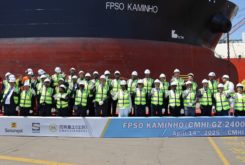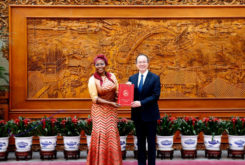Isabel dos Santos, Africa´s richest woman according to Forbes magazine, was known in her native Angola as the “princess”, until the 2017 presidential election resulted in João Lourenço replacing her father, José Eduardo dos Santos, as the country´s president. Just a year after the succession, she has become a regime nemesis, fingered as evidence of nepotism in the previous administration, and is fighting to hold on to her assets.
As Lourenço´s regime strives to change how the country is perceived abroad – often, in business circles, as ineffective and corrupt – the “princess” has been accumulating losses. Firstly, the presidency of state oil company Sonangol led to an initial clash with the new administration. More recently at the end of July, her advantageous position in the Angolan diamond trade and multiple state infrastructure concessions, from the Caculo-Cabaça dam, where she partnered with Chinese companies, to the Dande port, led to another clash with her company, Atlantic Ventures, and the government.
The 45 year-old engineer has for long proclaimed her business skills, in the face of those that saw her business empire – that includes stakes in Angola´s biggest Telecom, Unitel, and Banco Fomento Angola, among other assets in Portugal and Switzerland – as the result of reinvestment of appropriated state assets.
Isabel is the firstborn daughter of José Eduardo dos Santos and Tatiana Kukanova, whom the former president met and married as a scholarship student in Baku, former USSR, today the capital of Azerbaijan.
Until 1996, she lived with her mother in London, where she studied business management and acquired fluency in English – already being a speaker of Portuguese and French. She also assimilated much of the British education and manners, which she insists on cultivating, often correcting others in public.
She is at ease in business circles and participates actively in inherent social functions. As an entrepreneur, she has long been respected for the considerable financial resources at her disposal, along with political influences arising from her status as daughter of José Eduardo dos Santos. According to reliable sources, she shows preference for investments that generate a quick return.
In banking, Isabel holds a 25 per cent stake in BIC-Banco Internacional de Crédito, one of Angola´s biggest private banks. However, the “jewel” of her crown is UNITEL, the mobile telecommunications company, where she partners with Geni and MS Telecom, a subsidiary company of Sonangol, as well as with Brazilian group Oi.
Her interests in mining are vast and include stakes in: SODIAM, the diamond trading company, that also has among its shareholders Endiama, the state mining concessionaire, and Noé Baltazar, a former president of Endiama; ASCORP-Angola Selling Corporation, also a diamond trader, partnering with Endiama, Noé Baltazar and, in the past, businessmen Lev Leviev, Marc Rich and Lucien Goldberg; AMC- Angolan Diamond Corporation; set up to compete for the diamond concession of Camuté, initially in partnership with MMC-Malaysia Mining Corporation, that later retired; also in the mining sector, and historically connected to Noé Baltazar is Terramina.
Cleaning and sanitation of the city of Luanda has become another business arm, through URBAN, created in the 1990s with Christian Hellinger, with the privatization of Elisal. Urbinveste, another of her companies, obtained the concession for the urbanization of the area of Corimba seaside (Luanda South).
Among her initial foreign partners, almost all of them have the common feature of ancient and close connections with José Eduardo dos Santos. Namely: Marc Rich, the first “dealer” of Angolan oil abroad; Christian Hellinger, who had major interests in the diamond sector (discontinued); and Lev Leviev, formerly key player in the diamond industry, before Arkady Gaydamak and Alrosa started gaining ground.
Isabel’s special appetite for the diamond business (production/ trading) was also due to an old friendship with a renowned diamond trader, Jack Lunzer, an English Jew who was a close friend of her father in the 1990s.
According to our sources, Isabel and Noé Baltazar were key for dos Santos, in the 1990s and 2000s, to exercise control over the diamond sector – long disputed with the country´s influential generals.
Dropping 400 million dollars in 2017, her wealth today is valued by Forbes at 2,7 billion dollars, the ninth biggest fortune in Africa. Other than her assets in Angola, Isabel has stakes in some of the biggest Portuguese companies such as Nos (telecom), Galp Energia (energy), and Efacec (engineering), the result of sizeable investments over the last decade.
Her European manners, predilection for living abroad in London and, more recently, participation in international galas, showed the gap between her and the Angolan political and military elite, much of which has never willingly accepted her rapid amassment of wealth, often in deals with the state.
Her recent efforts to assert her merits as a manager included public appearances, conferences (London School of Economics, UK, 2017; Yale University, USA, 2018), international media interviews (Reuters, Financial Times), and also complaints, via advisors, to journalists who associated her fortune with nepotism.
The effort aimed to counter the notion that she had accumulated fortune thanks to deals with the state and public companies, profiting from her status as a member of the presidential family. However, the end of her father´s presidency revealed that – among the Angolan business and political elite – Isabel´s credit as a business leader was, in fact, low.



